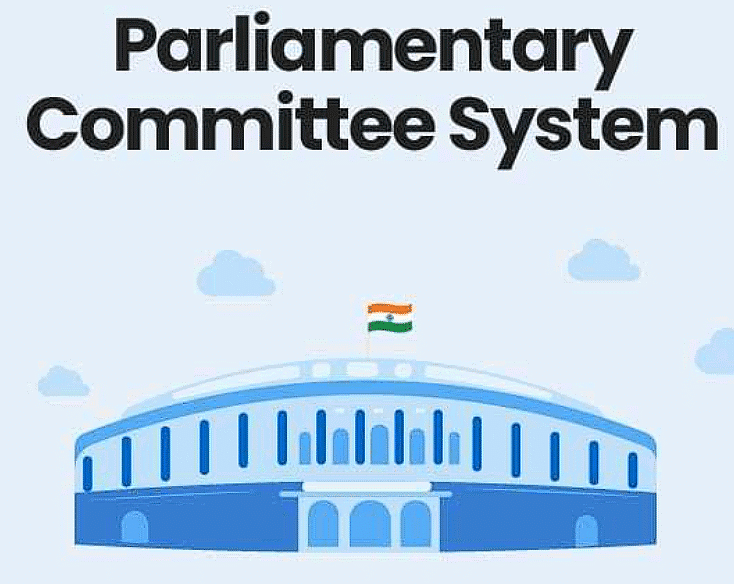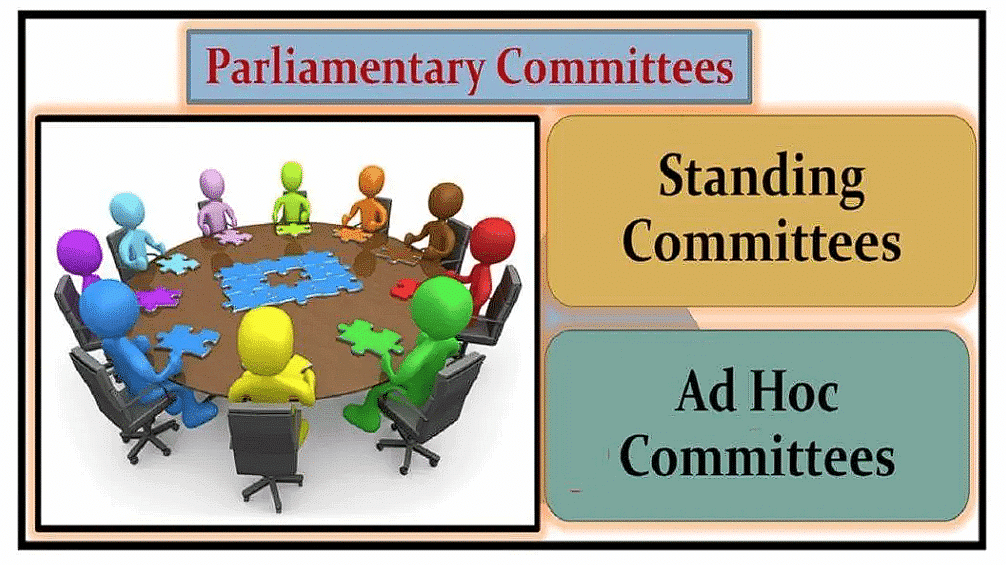Laxmikanth Summary: Parliamentary Committees | Indian Polity for UPSC CSE PDF Download
| Table of contents |

|
| What is a Parliamentary Committee? |

|
| Classification of Parliamentary Committees |

|
| Standing Committees |

|
| Ad Hoc Committees |

|
| Consultative committees |

|
The Parliament is a large and complex body, making it challenging to effectively discuss and decide on various issues. To handle this, the Parliament relies on committees to assist in its duties. Although the Indian Constitution mentions these committees without specifying their details, the rules of the two Houses cover matters like composition and functions.
What is a Parliamentary Committee?
A parliamentary committee is a group appointed, elected, or nominated by the House, working under the Speaker/Chairman's direction, presenting reports to the House or Speaker/Chairman, and having a secretariat provided by the Lok Sabha/Rajya Sabha.
Note: Consultative committees, though consisting of members of Parliament, aren't parliamentary committees as they don't meet all these conditions.
 Parliamentary Committee
Parliamentary Committee
Classification of Parliamentary Committees
Parliamentary committees are generally categorized into two types
1. Standing Committees: Standing Committees are permanent, formed regularly or annually, and operate continuously.
2. Ad Hoc Committees: Ad Hoc Committees are temporary, established for specific tasks and disbanded upon completing their assigned duties.
 Parliamentary Committees
Parliamentary Committees
Standing Committees
Based on the nature of functions performed by them, standing committees can be classified into the following six categories:
1. Financial Committees
(a) Public Accounts Committee: Established in 1921, this committee comprises 22 members elected annually. It is headed by an opposition member since 1967 and its primary function is to review the reports of the Comptroller and Auditor General (CAG) regarding government spending. It scrutinizes the accounts of the Union government, reviews state corporations and projects, examines autonomous bodies' accounts, and investigates cases of excess spending. However, it does not address policy matters and focuses on post-mortem analysis.
(b) Estimates Committee: This committee examines the budgetary estimates presented by the government. It reviews the allocations and expenditures proposed by various government departments and suggests modifications or improvements if necessary.
(c) Committee on Public Undertakings: This committee scrutinizes the functioning and performance of public sector undertakings. It assesses their financial and operational aspects to ensure efficiency and accountability.
2. Departmental Standing Committees
- These committees are formed to analyze and evaluate the work of specific government departments. They review the policies, budget allocations, and activities of these departments in detail. The purpose is to provide oversight, identify shortcomings, and suggest measures for improvement.
3. Committees to Inquire
(a) Committee on Petitions: This committee examines and considers public grievances and petitions submitted by individuals or organizations. It investigates the issues raised and makes recommendations for their resolution.
(b) Committee of Privileges: This committee deals with matters related to breach of privileges of members of the legislature. It investigates cases where the rights and privileges of members have been violated and takes appropriate action.
(c) Ethics Committee: The Ethics Committee ensures ethical conduct by members of the legislature. It examines complaints or allegations of unethical behavior and recommends appropriate action or disciplinary measures.
4. Committees to Scrutinize and Control
(a) Committee on Government Assurances: This committee reviews the assurances given by the government on the floor of the house. It ensures that the government follows through on its promises and takes action if any assurances are not fulfilled.
(b) Committee on Subordinate Legislation: This committee examines the rules, regulations, and by-laws framed by the executive branch of the government. It ensures that these subordinate legislations are within the scope of the parent legislation and do not exceed the powers delegated to the executive.
(c) Committee on Papers Laid on the Table: This committee examines the papers, reports, and documents laid on the table of the house by the government. It reviews the content, relevance, and compliance of these papers with the established procedures.
(d) Committee on Welfare of SCs and STs: This committee focuses on the welfare and development of Scheduled Castes (SCs) and Scheduled Tribes (STs). It reviews the implementation of government policies and programs aimed at uplifting these marginalized communities.
(e) Committee on Empowerment of Women: This committee works towards the empowerment and welfare of women. It examines issues related to gender equality, women's rights, and the implementation of policies and laws concerning women.
(f) Joint Committee on Offices of Profit: This committee examines the issue of members of the legislature holding offices that may influence their duties. It determines whether such offices are considered as offices of profit and makes recommendations accordingly.
5. Committees Relating to the Day-to-Day Business of the House
(a) Business Advisory Committee: This committee assists in planning and managing the business of the legislative house. It determines the agenda, scheduling, and allocation of time for various matters to be discussed in the house.
(b) Committee on Private Members' Bills and Resolutions: This committee deals with bills and resolutions introduced by individual members of the legislature. It examines these proposals, suggests modifications if required, and recommends their consideration in the house.
(c) Rules Committee: The Rules Committee formulates and reviews the rules and procedures governing the functioning of the house. It suggests amendments or additions to the existing rules to ensure smooth conduct of business.
(d) Committee on Absence of Members from Sittings of the House: This committee monitors the attendance of members during the sittings of the house. It keeps a record of members' presence and absence and takes appropriate action if required.
6. House-Keeping Committees or Service Committees
(a) General Purposes Committee: This committee deals with general administrative matters of the legislative house. It addresses matters related to the functioning of the house, maintenance of its premises, and allocation of resources.
(b) House Committee: The House Committee oversees the overall functioning of the legislative house. It manages the day-to-day operations, including staff appointments, maintenance of facilities, and coordination with other committees.
(c) Library Committee: This committee manages the library facilities provided to the members of the legislature. It ensures the availability of relevant books, journals, and research materials for the members' reference and study.
(d) Joint Committee on Salaries and Allowances of Members: This committee determines the remuneration, allowances, and other benefits for the members of the legislature. It reviews and recommends changes to the salary structure and perks provided to the members.
Ad Hoc Committees
Ad hoc committees can be divided into two categories, that is, Inquiry Committees and Advisory Committees.
1. Inquiry Committees:
- These are special groups formed sometimes by voting or decisions to look into specific issues.
- Examples include committees for railways, security, computers for members, food management, etc.
- They check and report on things like railway finances, security in Parliament, or how computers are given to members.
2. Advisory Committees:
- These are groups that give advice and focus on bills (proposed laws).
- When a bill is being discussed in a House, the House can decide to send it to a special committee.
- This committee then looks at the bill closely, suggests changes, and talks to experts if needed.
- They make a report, and if some members don't agree, they can add their own thoughts to the report.
Consultative committees
- Consultative committees are attached to various ministries and departments of the Central Government in India.
- These committees consist of members from both houses of Parliament.
- The Minister or Minister of State in charge of the respective ministry acts as the chairman of the committee.
- The committees provide a platform for informal discussions between ministers and Parliament members.
- The discussions revolve around government policies, programs, and their implementation.
- The Ministry of Parliamentary Affairs formulates guidelines for the composition, functions, and procedures of these committees.
- The committees are constituted after the formation of each new Lok Sabha (lower house of Parliament) and are dissolved upon its dissolution.
- The membership of these committees is voluntary and left to the choice of the members and their party leaders.
- The maximum membership of a committee is 30, while the minimum is 10.
- Separate Informal Consultative Committees are also formed for each Railway Zone, consisting of members of Parliament from the respective area.
|
145 videos|598 docs|203 tests
|
FAQs on Laxmikanth Summary: Parliamentary Committees - Indian Polity for UPSC CSE
| 1. What is the purpose of a Parliamentary Committee? |  |
| 2. What are the different types of Parliamentary Committees? |  |
| 3. What is the difference between Standing Committees and Ad Hoc Committees? |  |
| 4. How do Parliamentary Committees contribute to the legislative process? |  |
| 5. How are members of Parliamentary Committees selected? |  |

|
Explore Courses for UPSC exam
|

|


















